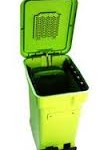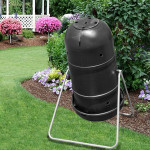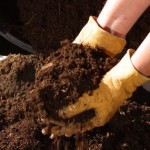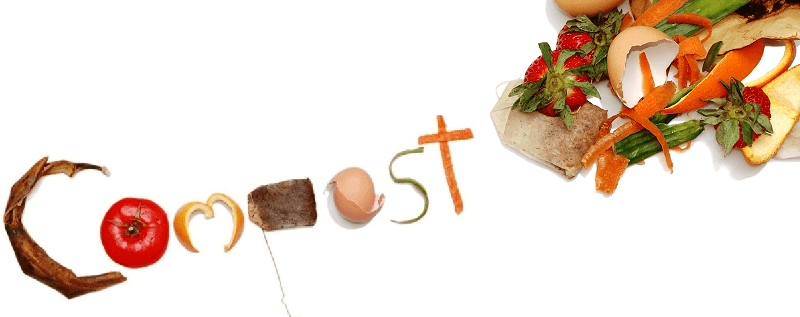Does this sound like a DIY project gone awry? As hard as k.o. kidz tried, we could not find reuse and repurpose ideas for these items. Well, we did come up with a few but they started to resemble caveman fashions so if you aren’t ready for eggshell earrings and banana peel skirts, we have another option – COMPOST.
Why Should We Compost?
What is a better way to recycle than to give back to the Earth the food scraps that can’t be consumed? Wait, don’t start eating that turkey bone wrapped in banana peel !
!
As it turns out, composting can be done easily, in any size home, at virtually no cost or effort. Compost provides valuable micronutrients (not found in commercial fertilizers) to soil, reduces landfill and greenhouse gases (see our post on ‘What’s Your Foodprint’ for more details), improves soil’s ability to retain water thus reducing runoff, saves us money (i.e. provides natural fertilizer and mulch, decreases garbage disposal time and costs), and even creates alternative energy!
According to the Environmental Protection Agency (EPA), diverting organic materials from landfills ultimately “avoids the production of methane and leachate formulation” most commonly known as ‘greenhouse gas’. A highly destructive by-product of landfill waste that causes soil pollution and global warming.
Additionally, Cornell University, Compost Power, University of Edinburgh, and others have found a way to capture the heat from decomposing compost to create an alternative energy source for heating water, buildings and other structures. Amazing, right?!
How To Compost?
Follow these simple 7 steps:

1. Choose a Container or Yard Space
If inside, grab a trash can of any size. We like an easy under the sink option, like recently launched, USA-made CompoKeeper with foot pedal for easy open and close.

If outside, clear an area with a flat surface, preferably out of sight and out of the way of any traffic areas! Or, you can use composting barrels and tumblers. We found a super deal on a RTS Tumbler through wayfair.com (53 Gal, $72.74 normally $237.00). Looking for an even cheaper option? For instructions to make your own, click here.
2. Add Compost or Topsoil
Now, your first ingredient ideally should be some finished compost, you can borrow this from a gardening friend, buy it, or use cheaper (less nutrient rich) topsoil. The point of this is to give a head start to the organisms responsible for breaking down the organic matter into compost. Don’t have this? Don’t worry! Move on to step 3.
3. Consider Brown to Green Ratio
You’ll want to have both brown (carbon) and green (nitrogen) organic matter. Compost scientists (yes there are compost scientists!) have found that the best ratio is about 25 parts carbon to 1 part nitrogen for the fastest decomposition, according to Planet Natural.
4. Add BROWN matter
The most common source of BROWN organic matter is dead leaves, but any dead plant material works, so long as it is not too woody (you can compost woody things, but they take much longer to break down, for best results try grinding it or cutting it up first).
Other common sources: cardboard and newspaper (shredded), vegetable and fruit scraps, peanut shells, and eggshells.
5. Add GREEN matter
Next, add GREEN matter, which actually includes any recently living or moisture filled organic waste. All your kitchen scraps, pulled weeds, cut plants, or grass clippings can be considered green matter. This green matter represents nitrogen mostly. If you add too much of it, or do not add enough brown, your compost might smell. Technically it is possible to compost other animal products as well, but they attract animals and rodents and can smell so not the best idea. Also, avoid any cooked or canned foods, even vegetables, that have been salted. Salt kills the organisms that will be decomposing your yard waste.
Common sources: coffee grinds and used filters, condiments and sauces, cut flowers, fruit rinds and cores, shells from shellfish, tea and tea bags, and stale or moldy bread and grain products.
6. Provide Aeration
Make sure that your compost has exposure to air and if possible turn your compost pile several times a month to provide oxygen and speed up the decomposition process.
7. Keep Moist
The final ingredient is water. You want the pile to be moist, but not wet, like a wrung out sponge.
Compost Success – What to do with your ‘black gold’?
So after you’ve created this wonderful compost bucket or pile, what do you do if you’re running out of space for the compost? Luckily, it only takes about 2-3 weeks for the matter to decompose thus significantly reducing the waste. Once it becomes finished compost, often referred to as “black gold” by master gardeners, it can be used on your lawn, garden, flower pots, or bagged and stored for later use.
Still have more compost than you know what to do with? Organizations like Collective Resource in Chicago will collect your organic waste weekly, bi-weekly, or monthly for a nominal fee. Community gardens are also more than happy to take your black gold and for those without personal ‘green space’, these organizations can be an amazing way to connect with nature and your neighbors!
Turning your nasty trash to garden compost is a wise, earth-loving, and money-saving choice for the home gardener as well as the couch potato. So save the stale, green bread and mushy, black bananas for a Mother Earth party and start composting today!
*Hey, let’s work together in fighting for a greener planet and healthier eating! Sign up at www.koecolife.com and receive valuable coupons, tips, & product updates. Be sure to follow us @kokidzcorp on Facebook, twitter, Instagram for our latest news and events too.





